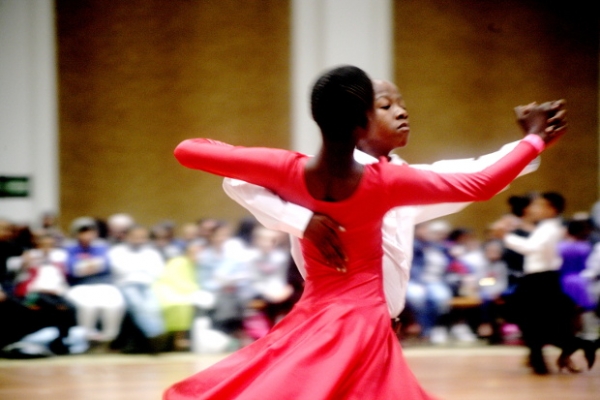

Kamva and Sinithemba (surnames withheld) from Mfuleni are ballroom dancers who have been promoted to the second highest title in their age division, pre-champion. Here they are dancing in a competition at Grand West Casino.
7 May 2015
A group of young ballroom dancers from the Mfuleni Dance School are well on their way to waltzing into the Western Cape’s top junior ranks this year.
This despite their dancers having to withdraw from some competitions because they could not afford to participate.
“The group is definitely doing very well. We have two couples going to the higher ranks this year, and I think they do stand a good chance of representing the province at nationals within the next two years,” said dance teacher Donovan Forbes.

Donovan Forbes trains young dancers.
The dancers rehearse twice a week at the Nobantu Centre as one of several activities offered to children attending the after-school programme of a non-profit organisation called Women for Peace.
Three years ago, Forbes was approached by one of the centre’s coordinators to assist a group of children who were eager to participate in competitions. Since then, dance classes have become a popular attraction at the centre.
However, as a result of limited space at the facility, the dancers only have two days a week to rehearse two different categories, Latin and Ballroom.
When GroundUp joined the team during a rehearsal, the sound of the samba and upbeat jive rhythms echoed in the small hall.
More than 20 dancers started doing the warm-up routine while eagerly fighting for space on the cramped dance floor.
As dance shoes and costumes are costly, the centre often relies on donations. Only five of the dancers were wearing basic dance attire.
“After school the centre offers a variety of activities, dance classes being one of them. The centre is being funded by a German company, which is main source of income to cover operational costs. Parents are also asked to contribute to the centre. They also pay a small fee of about R50 for dance which just about covers the basics,” Forbes said.
Forbes, who has been in the Latin and Ballroom dance industry for the past 23 years, said dance was a very expensive sport.
“Dance can become very costly because as you progress through the levels, you need to pay for costumes, extra lessons and entry fees for each competition. It’s really tough to see the amount of potential in the group, but we just can’t afford to go to each and every competition,” he said.
Forbes added that the centre often hired transport to get the children to the various competition venues and back home again.

Sihle Bula and Nobuhle Nkomo practice at the Nobantu Centre in Mfuleni.
Dancers in the group are aged between five and 20. Two of the couples are currently competing in high ranking junior levels in both Latin American and Ballroom.
The group is one of hundreds of dance schools that compete in a number of competitions held throughout the year under the Federation of Dance Sports South Africa.
“Under my guidance, in the first year alone, the school won six championship titles and a South African title. Last year they competed in the national competition which was held in Cape Town where two of our couples made finals. Another junior championship couple won the national title for 2014. This couple was promoted to pre-champ latin which is an amazing achievement,” he said.
One of the couples, Kamva and Sinethemba, both aged 14, have just been promoted to the second highest title in their age division, pre-champion.
During the one hour lesson they are often given the floor to practice their five different dances for each dance discipline. This compared to most competing couples who practice two to three times a week with additional private lessons.
“I started dancing in 2009, but I didn’t have a partner. I was given a partner the next year. I enjoy dancing a lot, especially ballroom. I want to be one of the world champions in ballroom one day and go overseas. Maybe be a part-time lawyer,” Kamva said.

Six-year-old Owam (surname withheld) won in her age category at a recent competition at Grand West Casino.